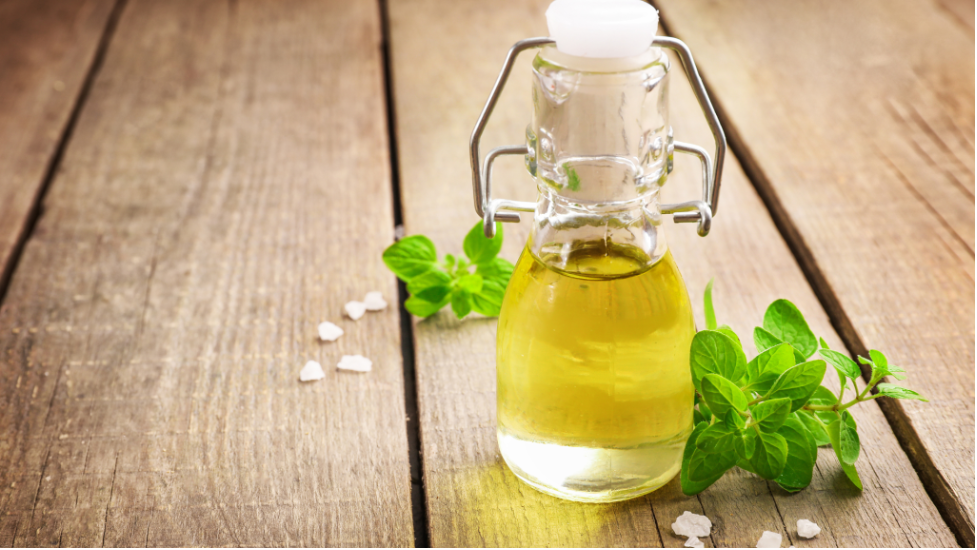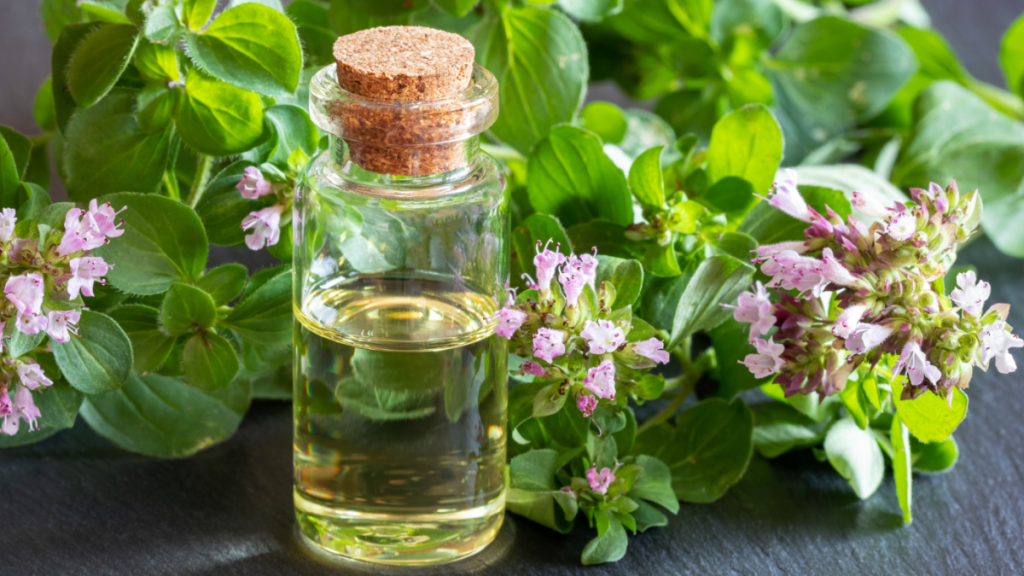Oregano oil, derived from Origanum vulgare, has become a powerhouse in the natural health world for its robust medicinal qualities. Known for its antimicrobial strength, antioxidant potential, and anti-inflammatory properties, this essential oil provides more than just a dash of flavor.
What is Oregano Oil?
Oregano oil is an essential oil extracted from the flowering tops and leaves of the Origanum vulgare plant, a perennial herb that belongs to the mint family, Lamiaceae.
There are over 60 known species of oregano, but the variety used in essential oil production, Origanum vulgare, is distinct due to its high concentration of active compounds, particularly carvacrol and thymol.
The primary compounds in oregano oil are carvacrol and thymol, both of which are types of monoterpenoid phenols. Carvacrol, which typically constitutes 60-80% of high-quality oregano oil, is largely responsible for the oil’s antimicrobial effects.
Thymol, although present in smaller amounts (usually around 5-10%), complements carvacrol by providing antifungal and anti-inflammatory properties.
Due to its high carvacrol content, oregano oil exhibits a strong spicy aroma and warm, herbal flavor. The oil’s rich blend of phenolic compounds gives it remarkable stability and resistance to oxidation, making it ideal not only as a natural preservative but also as a therapeutic agent.
Let’s take a closer look at the research-backed health benefits of oregano oil and how its unique chemical profile can contribute to your well-being.
Did You Know?
Essential oils are aromatic compounds extracted from plants, typically through steam distillation. They retain the characteristic scents and medicinal properties of the plant they’re derived from, and they’re used across various applications from skincare to wellness. Essential oils are unique in that they are highly concentrated, meaning that even a small amount can provide therapeutic effects.
Science Based Health Benefits of Oregano Oil
Oregano oil’s therapeutic properties are rooted in its complex chemical profile. Here’s a breakdown of the health benefits associated with its main active compounds.
1. Antimicrobial Properties
Oregano oil’s antimicrobial properties are attributed to its high levels of carvacrol and thymol. Studies indicate that these compounds work by breaking down the cell membranes of bacteria and fungi, inhibiting their growth. This antimicrobial effect has shown promise against a range of pathogens, including antibiotic-resistant strains.
According to experts at HerbaHealth, “Oregano oil drops high in Carvacrol offer a natural, potent defense against harmful bacteria and fungi, without the synthetic additives found in many other options”.
2. Anti-Inflammatory Effects
Inflammation, while part of the body’s natural immune response, can contribute to chronic conditions if left unchecked. Oregano oil’s compounds, particularly carvacrol, have been shown to suppress inflammatory mediators, making it useful for conditions like arthritis or muscle soreness. Laboratory studies confirm that carvacrol reduces levels of cytokines and other inflammatory markers, which play key roles in the inflammatory process.
3. Metabolic and Digestive Health
Beyond its antimicrobial properties, oregano oil can support digestive health and aid metabolic processes. Studies highlight that oregano oil may alleviate symptoms of indigestion, bloating, and even offer support for blood sugar regulation by reducing oxidative stress.
4. Antioxidant Power: Reducing Oxidative Stress
Speaking of oxidative stress, Oregano oil has shown the ability to neutralize free radicals, reducing oxidative damage that could lead to chronic illnesses, such as cardiovascular disease and neurological disorders. Studies have observed significant antioxidant effects of carvacrol and thymol, as they scavenge free radicals and reduce oxidative stress markers in the body.

Potential Side Effects and Restrictions
While oregano oil can be a valuable addition to your supplemental stack, it should be used with caution due to its strong concentration.
| Avoid Direct Consumption | Pure essential oregano oil is highly concentrated and can cause irritation if ingested undiluted. Dilute with a carrier oil, such as olive oil, before ingestion. |
| Pregnancy and Breastfeeding | Due to its potency, oregano oil should generally be avoided during pregnancy and breastfeeding. |
| Nausea | May occur if taken on an empty stomach |
| Allergic Reactions | Risk for those allergic to other Lamiaceae plants |
| Interaction with Medications | Avoid with blood thinners and diabetes medications |
| Abdominal Pain | Possible if taken in high doses |
| Headaches | Reported in some individuals after ingestion |
How to Use Oregano Oil Safely
Given its concentrated nature, using oregano oil safely is quite straight forward. You will often find it in supplement form, such as:
1. Capsules or Tablets: These pre-measured doses are convenient and often include appropriate dilutions, making them safe and easy to use.
2. As drops (mixed with a Carrier Oil): For internal use, use oregano oil drops that are diluted with olive oil or another carrier oil. This reduces the risk of irritation or digestive issues.
Tip: Taking oregano oil with food can enhance absorption and help minimize any digestive discomfort.
Since there is limited research on the precise dosage, it’s generally advised to start with a minimal amount based on the supplement‘s recommendations and observe how your body responds.
Takeaways
Oregano oil, with its rich profile of bioactive compounds, stands out as a versatile natural supplement. Its antioxidant, antimicrobial, and anti-inflammatory properties, backed by scientific studies, offer support for immune health, metabolism, and oxidative stress reduction. The key to unlocking its benefits, however, lies in responsible use and mindful consumption.
As noted by HerbaHealth, “Organic oregano oil drops offer a natural and potent alternative for those looking to support their health without relying on synthetic additives,” making it an excellent addition for holistic health regimens.
